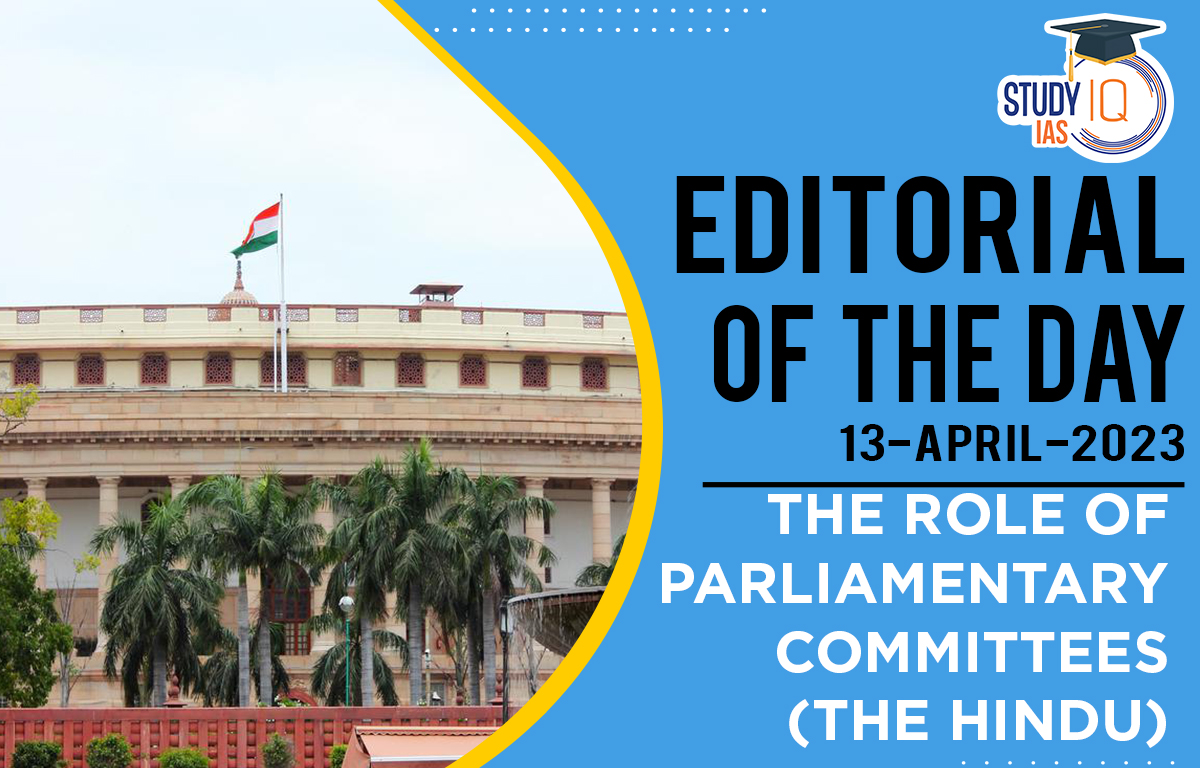Table of Contents
Context: The article highlights the idea that the true work of any Government often takes place behind the scenes (committee rooms, where the actual work of making important decisions and legislations takes place) that may not be visible to the public eye. It stresses on the fact that Parliamentary committees are where the representatives can work more efficiently and effectively without the distractions of the public and the media. On the floor of the House, while the legislators may be more focused on public relations and political posturing, it is in these committees, they can concentrate on the actual work of crafting legislation, debating issues, and making decisions without the added pressure of public scrutiny.
The Role of Parliamentary Committees Background
What are Parliamentary Committees?
- Parliamentary Committees trace their origins back to the British Parliament.
- They are a panel of Members of Parliament (MPs) appointed, elected or nominated by the House or Speaker/Chairman.
- These committees operate under the guidance of the Speaker/Chairman and submit their findings to the House or the Speaker/Chairman.
- Constitutional Provisions: They draw their authority from Article 105 and Article 118.
- Article 118: The article empowers Parliament to make rules for regulating its procedure and conduct of business. These rules often provide for the appointment, composition, and functions of the various Parliamentary committees.
- Article 105: Provides for the privileges and immunities of Parliament and its members, which extends to the committees as well.
What are the various types of Parliamentary Committees?
The Indian Parliament has multiple types of committees that can be differentiated on the basis of their work, their membership and the length of their tenure. However, broadly there are two types of Parliamentary Committees– Standing Committees and Ad Hoc Committees.
- Standing Committees: The Standing Committees are permanent (constituted every year or periodically) and work on a continuous basis. They can be classified into the following six categories:
- Financial Committees
- Departmental Standing Committees
- Committees to Enquire
- Committees to Scrutinize and Control
- Committees Relating to the Day-to-Day Business of the House
- House-Keeping Committees or Service Committees
- Ad Hoc Committees: Ad Hoc Committees are temporary and cease to exist on completion of the task assigned to them. They are further subdivided into Inquiry Committees and Advisory Committees.
- The principal Ad hoc Committees are the Select and Joint Committees on Bills.
Significance of the Parliamentary Committees:
- Improves effectiveness of Parliament by serving as a mechanism to scrutinize legislation and hold the executive accountable.
- Facilitates inter-ministerial coordination by working closely with multiple Ministries.
- Performs important functions such as examining Bills, demands for grants, annual reports, and long-term plans of Ministries/departments.
- Plays a significant role in legislative business as the process of lawmaking is often complex and Parliament has limited time for detailed discussions.
- Provides a platform for experts and stakeholders to give input on various matters and helps parties reach consensus on issues.
Challenges faced by the Parliamentary Committees in India:
- Sidelining of the committees: According to PRS Legislative Research, the number of bills referred to parliamentary committees has declined over the years. In the 15th Lok Sabha (2009-2014), only 71 out of 328 bills introduced were referred to committees, while in the 16th Lok Sabha (2014-2019), only 25 out of 205 bills introduced were referred to committees. This indicates a trend towards sidelining committees and rushing legislation through without adequate scrutiny.
- The sidelining of parliamentary committees can lead to a weakening of parliamentary democracy and a lack of oversight of the government’s actions.
- Other challenges: A study by the Commonwealth Parliamentary Association (CPA) found that committees in India face several challenges, including a lack of resources, inadequate training and support, and limited access to information and expertise.
- These factors can limit the effectiveness of committees and undermine their ability to provide meaningful oversight of the executive branch.
Decoding the Editorial
The article explains the importance and relevance of parliamentary committees in the Indian Parliament.
- Decline in Expert Scrutiny of Legislation:
- The current political climate of resentment and polarization is reflected in the public proceedings of the House, which do not allow for meaningful deliberation or consensus-building.
- As a result, there has been a declining trend of national legislation being subjected to expert scrutiny through parliamentary committees.
- Data indicate that during the 16th Lok Sabha, only 25% of the Bills introduced were referred to committees, which is significantly lower compared to the 71% and 60% referred in the 15th and 14th Lok Sabha respectively.
- This means that fewer Bills are being subjected to expert scrutiny and potentially missing out on necessary modifications and improvements before being passed into law.
- Need for the Parliamentary Committees:
- The article highlights the fact that due to the enormous volume of information and the scale of operations that the Indian Parliament is required to undertake, it is not feasible to take up all issues on the floor of the House.
- Therefore, parliamentary committees are formed to deal with specific issues and concerns that are sector-specific.
- The role of parliamentary committees is not limited to examining and scrutinizing bills; but they play a much broader and critical role in making the Parliament a functional and dynamic space where members can come together to debate and discuss matters that concern the nation.
- The ceaseless effort of these committees brings the highest platform of multilateral dialogue in India to life.
- Evolution of Parliamentary Committees:
- Even though a structured committee system was only established in 1993, individual committees have been formed for various reasons since the country’s independence.
- The article specifically mentions the example of five crucial committees of the Constituent Assembly, which were formed during the process of drafting India’s constitution.
- Five Important Committees: The important committees in the history of the Indian Parliament include:
- The Ad Hoc Committee on the Citizenship Clause: This Committee on the Citizenship Clause was formed to discuss the nature and scope of Indian citizenship, and its findings were important in shaping India’s citizenship laws.
- The Northeast Frontier (Assam) Tribal and Excluded Areas Sub-Committee: This committee chaired by Sh. G.N. Bordoloi covered a range of issues related to the Naga, Khasi, Garo, Jaintia, and Mikir Hills. It collected important data on the region’s status quo, including issues related to land, forests, local government, and courts, which were then used to determine rights and privileges for the region.
- The Excluded and Partially Excluded Areas (Other than Assam) Sub-Committee: This committee chaired by Sh. A.V. Thakkar, was important in determining the status of areas outside of Assam. It also dealt with scheduled areas in the Chhota Nagpur Plateau and was an important document that highlighted the concerns of Adivasi leaders regarding the exclusion of certain districts.
- Expert Committee on Financial Provisions of the Union Constitution 1947: This committee was responsible for giving recommendations on Union and Province (State) tax collection, central excise duty, liquor revenue, divisible pool of income tax, sharing of proceeds among provinces, residuary powers, and the institutions of the Finance Commission and the Auditor General, among other things.
- The Advisory Committee on the Subject of Political Safeguards for Minorities 1949: This committee chaired by Sardar Patel, looked at the abolition of reservations for religious minorities.
- Role of the Committees: The significant role played by committees in the functioning of the Indian Parliament include:
- The committees are responsible for analyzing specific pieces of legislation, examining their impact on governance, and making recommendations.
- While the government is not bound to act on these recommendations, it is required to table an ‘Action Taken’ report in the House to update members on the progress made on the suggestions of the committee.
- This process ensures that the legislature can provide oversight on the executive.
- The committee reports provide objective assessments, free from partisan divides, and enable consensus-building.
- This is in contrast to discussions on the floor of the House, where parliamentarians are often influenced by their party-line and voter base.
- Examples:
- The Business Advisory Committee is responsible for preparing the schedule of both Houses of Parliament, ensuring that the proceedings run smoothly.
- The papers laid on the table of the House, which are often overlooked, are prepared by a dedicated committee after a thorough process of deliberation, writing, and screening.
- The Committee on Rural Development & Panchayati Raj plays a crucial role in identifying inconsistencies on the part of the government for effective governance.
- Legislations Referred to the Committees: The committees have played a significant role in the development and implementation of important legislation.
- Digital Data Protection Bill in recent years.
- The Justice Srikrishna Committee was formed in 2017 to prepare a data protection framework for India, following the Puttaswamy judgment that recognized privacy as a fundamental right.
- The committee’s final report in 2018 served as the basis for the Personal Data Protection Bill, 2019, which was tabled in the Lok Sabha.
- The bill was then referred to the Joint Parliamentary Committee, which presented its report in December 2021, leading to the withdrawal of the bill and the introduction of a new Draft Digital Data Protection Bill for public consultation in November 2022.
- In each iteration, the committees provided insights that helped shape the legislation and ensured that it meets the needs of a growing economy in the digital age.
- Other Legislations: Other important laws such as the Prohibition of Child Marriage (Amendment) Bill that seeks to raise the legal marriageable age of women to 21, the Anti-Maritime Piracy Bill that brings into enactment the UN Convention on the Law of the Sea for combating piracy in the high seas, the Jan Vishwas Bill that amends 42 laws across sectors like agriculture and media, the Wildlife Protection (Amendment) Bill that extends the scope of protected species, the Competition (Amendment) Bill, the Electricity (Amendment) Bill, the Criminal Procedure (Identification) Bill, and the Multi-State Cooperative Societies (Amendment) Bill have all been referred to Committees.
- Digital Data Protection Bill in recent years.
- Nation Building: Committees play a crucial role in examining and addressing issues that may not have immediate political significance, but are important for the long-term development and security of the nation.
- Example: The Public Accounts Committee in a 2015 report, highlighted several concerns related to defence shipyards, such as inadequate shipbuilding practices, delays in finalization of weapon packages, and underestimation of costs by shipyards.
- Such issues may not receive attention in the Lok Sabha or other political forums, but Committees can bring them to the forefront and make recommendations for their resolution.
Way Forward
- The article suggests that The Indian Parliament should consider adopting a procedure where all Bills that are introduced on the floor of the House must be referred to the relevant committees for scrutiny and modifications before they are put to vote. The author believes that giving more powers to the committees will enable them to hold the executive accountable and prevent them from being ineffective. This, in turn, will help to institutionalize procedures for lawmaking and reduce political considerations from hastening the process. Therefore, creating a robust parliamentary ecosystem in India that prioritizes accountability and transparency is the need of the hour.


 Serious Fraud Investigation Office (SFIO...
Serious Fraud Investigation Office (SFIO...
 Article 142 of Indian Constitution, Sign...
Article 142 of Indian Constitution, Sign...
 Pakistan-Occupied Kashmir (PoK): History...
Pakistan-Occupied Kashmir (PoK): History...





















